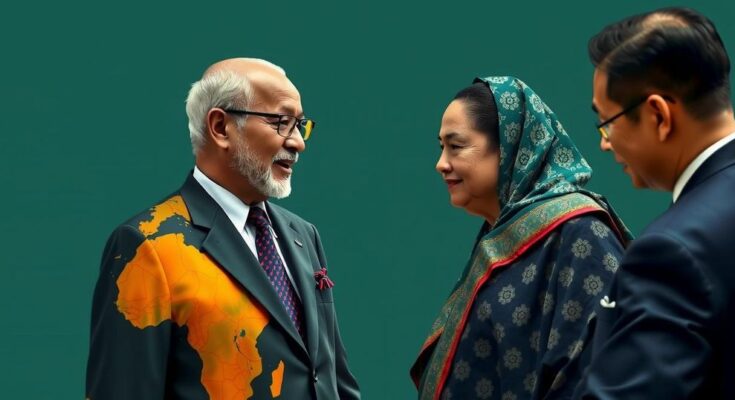President Joe Biden is set to visit Angola, marking a significant moment in U.S.-Africa relations aimed at countering China’s influence in the region. The trip focuses on showcasing U.S. investments, particularly the Lobito Corridor project, while fostering higher-standard partnerships and addressing shared challenges with African nations. Biden’s engagement with Angolan leadership reinforces the strategic importance of Angola as a key U.S. ally in Africa.
President Joe Biden is embarking on a significant journey to Africa, fulfilling a promise made two years prior. As he departs for Angola, the primary focus of this visit is to reinforce U.S. investments and partnerships in the region amid the increasingly dominant presence of China. This three-day trip, taking place toward the end of Biden’s presidency, underscores America’s strategic efforts to enhance its diplomatic and economic ties in Africa, particularly with Angola, a key ally that has shown crucial support in addressing regional conflicts.
Biden’s arrival in Luanda will mark a notable moment, as it will be the first visit to sub-Saharan Africa by a sitting U.S. president since Barack Obama’s trip in 2015. Angola, which has proven to be a vital partner in various initiatives, has also become a focal point for U.S. efforts to counteract the influence of both China and Russia, who have significantly invested in African infrastructure and resources over the past decade. This visit is eagerly anticipated, especially as it comes after an earlier postponement due to natural disasters in the U.S.
The Lobito Corridor, an ambitious 800-mile railway project supported by the U.S. and European investments, will be central to Biden’s discussions. This corridor is designed to enhance the transport of essential minerals from the interior of Africa to Angola’s western port, demonstrating the Biden administration’s shift from mere developmental aid to strategic investments that offer alternatives to lesser-quality ventures, particularly those associated with Chinese investments.
This shift in strategy aims not only to provide enhanced investment opportunities but also to raise standards regarding investment practices in Africa. A senior administration official emphasized that such alternatives to Chinese investment demonstrate the U.S. commitment to fostering equitable and sustainable development in the region, stating that the intention is to provide countries the choice for higher standards rather than defaulting to low-quality investments linked to corruption and labor violations.
As Biden engages with President João Manuel Gonçalves Lourenço and local leaders, he plans to address topics ranging from health security partnerships to the preservation of cultural heritage. His itinerary includes a visit to the site of the National Slavery Museum and consultations regarding Angola’s nomination for UNESCO World Heritage status for the Kwanza Corridor, each aspect symbolizing deeper U.S.-Angolan ties. This trip is crucial for solidifying America’s role in Africa and countering foreign influences that threaten U.S. interests in the region.
Looking ahead, Biden’s interactions during this visit may shape future U.S. foreign policy in Africa, with hopes of continuity regardless of the upcoming administration. Angolan President Lourenço expressed confidence in working with whomever is in office, emphasizing the stability and ongoing importance of U.S.-Angolan relations independent of political transitions in the United States.
This article discusses President Joe Biden’s impending visit to Angola as part of a broader strategy to reinforce U.S. influence in Africa amidst growing Chinese and Russian presence. The trip is significant as it fulfills a previous commitment and highlights the Biden administration’s focus on investment-driven partnerships rather than traditional aid models. The Lobito Corridor project is a key component of this initiative, aimed at improving infrastructure and trade connections within the region.
In conclusion, President Biden’s visit to Angola represents a crucial effort to strengthen U.S. ties within Africa, specifically in combating the rising influences of China and Russia. Through strategic investment initiatives and collaborations, the Biden administration seeks to present an alternative approach to African partnerships, emphasizing quality and responsible investment practices. The outcome of this visit could have lasting implications for future U.S.-African relations and initiatives.
Original Source: www.cnn.com




